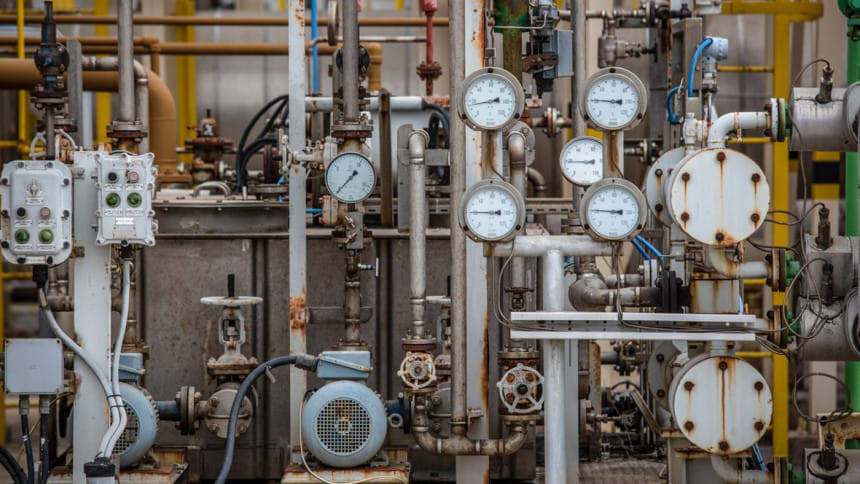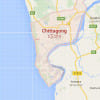Gas price hike spells trouble for industries

The latest hike of gas prices undoubtedly spells trouble for industries as they will try to shift the burden onto consumers by raising product prices, which will boomerang onto them by eating away at their competitiveness in international markets.
At home, households will fare no better as consumer goods will get battered amidst multipronged inflationary pressure.
For large industries, the price of gas per unit has spiked nearly threefold from Tk 11.98 to Tk 30, as per a notification issued by the Energy and Mineral Resources Division yesterday.
However, the government has not increased the price of compressed natural gas (CNG) used in the transport sector alongside gas used in homes.
Industries accounted for 18 per cent of the 1,017.5 billion cubic feet (BCF) of gas sold by state companies during the financial year of 2020-21.
The power sector was the biggest consumer, with the plants purchasing 42 per cent of total gas supplied to the industries, according to Petrobangla's annual report of 2020-21.
Captive power, used mainly by private sector mills, accounted for 17 per cent of the total sales of gas in fiscal year 2020-21 followed by households, fertiliser manufacturing, transport, restaurants and tea production, it showed.
With the hike due to come into effect from February, business have expressed their concern.
"It will be tough for industry to sustain as the price hike of gas would impact cost of production and reduce competitiveness in international markets," said Anwar-ul Alam Chowdhury Parvez, president of the Bangladesh Chamber of Industries.
Exports will decline and impact foreign exchange reserves. The same could happen for domestic sales as the price of products will increase while consumers will opt out as their income has not accordingly increased, he said.
The domestic market of basic industries will be weakened and unemployment will increase while banks will have to deal with some investors being unable to pay loan instalments, he said.
Inflation will increase and with the possibility of a recession looming globally and general elections due to be held early next year, the situation is not favourable for businesses, he said.
"Such a jump in prices will double our production cost," said Mohammad Ali Khokon, president of Bangladesh Textile Mills Association.
"The government has increased gas prices but it has not made it clear whether we will get uninterrupted gas supply," he said, adding that textile millers would now suffer more.
"The sudden increase would raise production cost that would reduce the business margin of exporters," said M Shahadat Hossain Sohel, chairman of the Bangladesh Terry Towel & Linen Manufacturers and Exporters Association.
"We cannot increase the price of export products as it will prompt buyers to search elsewhere for cheaper products," he noted.
He said the government needs to address corruption and irregularities in the energy sector instead of increasing gas prices in the name of subsidy withdrawal.
The hike rate should have been reasonable, said Faruque Hassan, president of the Bangladesh Garment Manufacturers and Exporters Association.
Uninterrupted supply should be ensured while illegal connections severed and system losses reduced, he said.
There will be multiple impacts on the market which would trickle down onto consumers, said Mohammed Amirul Haque, managing director of Premier Cement Mills.
Basically, the subsidy burden has prevailed for so long that the government had no alternative, he said, adding "The government should increase the price in phases which would be tolerable for all."
The hike is intolerable as it will push up production costs in agro processing and of consumer products by 10 per cent, said Eleash Mridha, managing director of Pran Group.
The ceramic sector is dependent on both gas and import of raw materials and production cost will rise by a huge margin, said Irfan Uddin, general secretary of the Bangladesh Ceramic Manufacturers and Exporters Association.
The rise in production cost will be higher for small steel mills rather than the large ones, said Tapan Sengupta, deputy managing director of BSRM.
With steel being a basic product of construction and development work, expenses in these areas will increase, he said.
This only added to the sufferings stemming form the pandemic and the Russia-Ukraine war, said Md Kamal Mia, owner of Kamal Machine Tools in Bogura.
Production will decrease and prices will go up, falling on the shoulders of consumers, he said.
This might have alleviated some of the pressure but there is no way for the government to completely stop providing subsidies, said Khondaker Golam Moazzem, research director of the Centre for Policy Dialogue.
Use of domestic gas has to be strengthened by increasing production of old gas fields and reducing import dependence of liquefied natural gas, he said.
However, there is no scope to guarantee uninterrupted gas supply to industries, said Moazzem.
The challenges that the industries are currently facing with gas are likely to increase a bit more in the summer, he said.


 For all latest news, follow The Daily Star's Google News channel.
For all latest news, follow The Daily Star's Google News channel. 







Comments